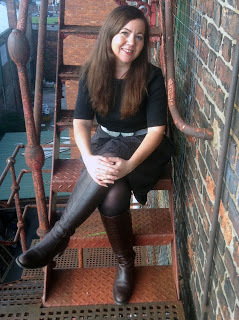Poor me? Poor OsborneAll this talk about saving money is ...
Poor me? Poor Osborne
All this talk about saving money is embarrassing. Maria Roberts on making work pay.
This article appears as an edited version on The Telegraph here.
If you want to rant at me, I'll reply in the comments section below.
Find me on twitter @Maria_Roberts

When I listened to the news last night reporting on George Osborne's plans to take £1,300 a year, £108.33 a month – that's £25 a week – away from low-paid families, I cried. I imagine £25 a week is what Osborne might spend on a bottle of wine; or as he'd have us believe it's equivalent to five bottles of wine at £5 per bottle from Aldi for those lazy low-income families on their zero-hour contracts. Let them eat lobster from Lidl and make risotto! But when you are strapped for cash, like I am, £25 is equivalent to week's worth of vegetables, milk and eggs – not a bottle of Pouilly-Fuissé.
Cuts don't just affect the working classes. This is a text I received yesterday from my friend, a geneticist from Cambridge: "Can't believe I'm 50, with a PhD and experience and on the poverty line". She's a single mum with two kids; her husband of twenty years relocated the family (for which she gave up her well-paid research position), had an affair with a woman half his age and left her high and dry. My friend's career and earning potential was irreparably damaged. She went from a household income of in excess of £100K per year to income support, followed by a lower-paid position. It isn't that easy to find a well-paid skilled job – for professionals or anyone else.
Women are taxed for having periods and then we are penalised for being parents.
Let me be frank. Pretty soon, because my son is 17, I may no longer be eligible to claim tax credits. Likewise my employment situation has changed, so I won't need to. And as we're all too embarrassed to talk about money, I'll put my own purse on the line: in the 2014-15 tax year I took home £1,316.93pcm after tax (£60.78 a day) and around £53 per week in tax credits. I must have applied for a hundred jobs, then eventually opted to retrain. I didn't want to be on a low-income. We just happened to be in a recession.
My son and I are almost certain that he may not go to university (despite his scholarship to a top independent school and raft of As and A*s at GCSE), because it is beyond our means. University is a luxury we cannot afford and, like a 1960s matriarch, I really need him to start contributing to the household bills. Social mobility is getting so out of reach in our small family that we may as well just stay here on the council estate and eat Jaffa Cakes. Forever.
It's possible that by 2016-17 I won't be taking anything at all from HMRC, just putting it back in. Let me also be clear that when I no longer need tax credits (which will be for the next 28 years of my working life), I am more than happy to know that my taxes will contribute to supporting low-income families and individuals (let's not forget the childless that struggle, they are just as important).
Yes, I want to pay my taxes to help others because I myself was helped; what's so wrong with that? Thank goodness for the British welfare system. When it works.
I cried at the news because I know first-hand what reliance upon a measly £25 per week feels like: to begin to make more savings to my sawdust life, I would need to give up tea, coffee, fruit juices, cordial, sugar, bread, butter, milk and a bottle of cheap plonk each week. We'd have to drink tap water. Constantly.
Whilst my financial situation at home is best described as tight, I had assumed I was doing okay. I was wrong. I have been poor for a decade.
I'd always thought my household income was 'around average' but according to the Joseph Rowntree Foundation's report A minimum income standard for the UK in 2015 by Donald Hirsch, published July 2015), I've been living well below the poverty line for some time – I just hadn't realised it because I hadn't bothered to study the cost of living.
It turns out some of my friends – journalists, authors, artists – are living in poverty too.
JRF's ongoing research measures poverty as relative to the society in which you live: you need a minimum income (MIS) to participate in that particular society, if not basic needs fail to be met. Poverty is seen in context to what is happening in the UK, not for example compared to a family in India.
In my case, as a single parent with one child, that income is £26,725. I've been living more than 25 per cent below that threshold for the past two years (with a household income of approximately £20,000 including tax credits and child benefit, for two people). This is because my full-time contract was reduced to 0.8 pro rata and for four years I didn't receive a pay rise. It was only in September this year that my hours finally increased to full-time, taking me into a slightly safer financial zone.
I generally describe myself as being 'strapped for cash', 'a bit broke right now', or 'skint'. But that doesn't do my situation justice. The correct description for me is 'poor' or that very modern term 'working poor'.
From 2011-2015 I earned less per annum than in 2008-2011 – yet my required MIS in 2015 is 123.89% higher than that in 2008. Instead of accruing wealth since my early twenties, I've accrued debt. I'm poorer in real terms than I was aged 23.
The Joseph Rowntree Foundations' observations are true. I don't participate in society like others might. My personal austerity measures may look like lifestyle choices, but they are essential to meet my living costs:
• I haven't owned a television for six months because it broke and I can't afford to buy a new one. When I tell people I don't own a TV, they think I'm making an intellectual statement. I'm not. I need to save £145.50 a year on my TV licence.
• We stopped eating meat a year ago because meat is unaffordable. For example, a free-range chicken costs £7 – for that I can make three vegetarian meals.
• I only ever buy my clothes from charity shops. This makes me look ethical and alternative but I'd prefer to shop new sometimes.
• I can't afford both public transport for my son to go to school (£65pcm) and for me to get to work (£120pcm) and so I cycle 36km a day whilst he has a bus ticket.
• I cook my meals for the week all at once (it takes around seven hours), this reduces waste and means two onions, spinach, lentils, a sweet potato, a carrot, two courgettes, a single aubergine, coconut milk and two tins of tomatoes can be used to make soup, lasagna, curry and a chilli.
• My 17 year-old son has worked since he was 14 because I cut his pocket money. He even worked through his GCSEs and he's been buying his own clothes and shoes for years.
• I dilute bottles of semi-skimmed milk with water to make it last longer. (My friends hate this.)
• We haven't had a family holiday for two years.
I could go on.
I used to be pedestrian poor, but now I'm the aspirational poor. As a 37 year old woman, I have a degree and an MA, I'm an author, and I'm studying for an M.Sc. in Media Management so that I can increase my earning potential (it's a heavily discounted online course, naturally, but I feel it's essential to keep my skills relevant). I've given guest lectures at universities and I've appeared on radio and TV. For four years I've worked as the editor of an international business magazine for the arts, for which I've travelled to San Francisco, Taipei, Singapore, New York, Madrid, Budapest and Hong Kong to name a few. That's employment for you.
Culturally, I'm rich. As an arts journalist, my personal playground is full of classical music, theatre, literature and opera launches.
A friend of mine says I have a way of finding glamour in poverty. I hate this idea: there's nothing glamorous about poverty. As a woman, I would have been at least £25,000+ a year better off getting married, not getting educated.
In the 15 years since I graduated from university, I haven't improved my standard of living at all.
I'm simply better at being poor.
Maria Roberts is author Single Mother on the Verge (Penguin)
www.singlemotherontheverge.com
@Maria_Roberts
Published on October 23, 2015 04:17
No comments have been added yet.



